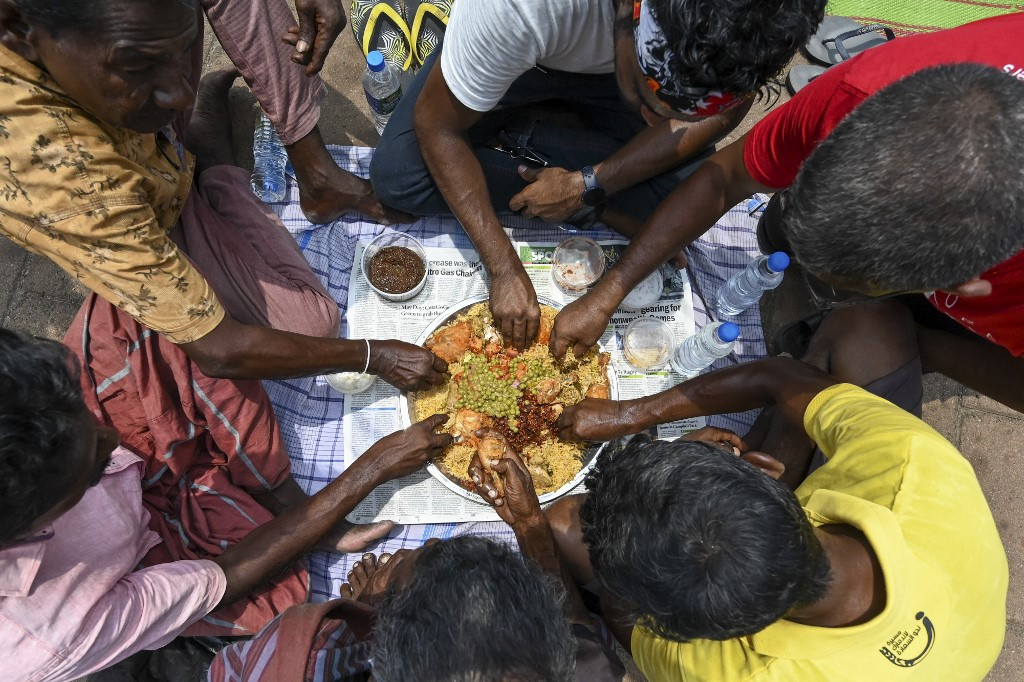How to produce more food, curb prices and save nature
Research conclusively shows that organic farming produces much less food than conventional farming per hectare.
Change Size
 Protestors gathered at the entrance of Sri Lanka's President Gotabaya Rajapaksa office, eat food while sitting along a road during the Idul Fitri festival celebrations in Colombo on May 3, 2022, as they demand the resignation of president over the country's crippling economic crisis. (AFP/Ishara Kodikara)
Protestors gathered at the entrance of Sri Lanka's President Gotabaya Rajapaksa office, eat food while sitting along a road during the Idul Fitri festival celebrations in Colombo on May 3, 2022, as they demand the resignation of president over the country's crippling economic crisis. (AFP/Ishara Kodikara)
A
global food crisis is looming, so policymakers everywhere need to think hard about how to make food cheaper and more plentiful. That requires making a commitment to producing more fertilizer and better seeds, maximizing the potential offered by genetic modification, and abandoning the rich world’s obsession with organics.
Russia’s brutal war in Ukraine is making less food available because the two nations have been responsible for more than a quarter of global wheat exports and big quantities of barley, corn and vegetable oil. On top of punishing climate policies and the world emerging from the pandemic, prices of fertilizer, energy, and transport are soaring, and food prices have climbed 61 percent over the past two years.
The war has exposed some harsh truths. One is that Europe - which portrays itself as a green energy trailblazer – is highly reliant on Russian gas, especially when the sun is not shining or the wind is not blowing. The war has reaffirmed the basic reality that fossil fuels remain crucial for the vast majority of global needs. And the emerging food crisis now reveals another harsh truth: organic farming cannot feed the world and could even worsen future crises.
Long simply a fashionable trend for the world’s 1 percent, environmental activists have increasingly peddled the beguiling idea that organic farming can solve hunger. The European Union is actively pushing for a tripling of organic farming on the continent by 2030, while a majority of Germans actually think organic farming can help feed the world.
However, research conclusively shows that organic farming produces much less food than conventional farming per hectare. Moreover, organic farming requires farmers to rotate soil out of production for pasture, fallow or cover crops, reducing its effectiveness. In total, organic approaches produce between a quarter and half less food than conventional, scientific-driven agriculture.
This not only makes organic food more expensive, but it means that organic farmers would need much more land to feed the same number of people as today—possibly almost twice the area. Given that agriculture currently uses 40 percent of Earth’s ice-free land, switching to organics would mean destroying large swathes of nature for less effective production.
The catastrophe unfolding in Sri Lanka provides a sobering lesson. The government last year enforced a full transition to organic farming, appointing organics gurus as agricultural advisors, including some who claimed dubious links between agricultural chemicals and health problems. Despite extravagant claims that organic methods could produce comparable yields to conventional farming, within months the policy produced nothing but misery, with some food prices quintupling.
Sri Lanka had been self-sufficient in rice production for decades, but tragically has now been forced to import US$450 million worth of rice. Tea, the nation’s primary export crop and source of foreign exchange, was devastated, with economic losses estimated at $425 million. Before the country spiraled downward toward brutal violence and political resignations, the government was forced to offer $200 million in compensation to farmers and come up with $149 million in subsidies.
Sri Lanka’s organic experiment failed fundamentally because of one simple fact: It does not have enough land to replace synthetic nitrogen fertilizer with animal manure. To shift to organics and keep production, it would need five to seven times more manure than its total manure today.
Synthetic nitrogen fertilizers, mostly made with natural gas, are a modern miracle, crucial for feeding the world. Largely thanks to this fertilizer, agricultural outputs were tripled in the past half-century, as the human population doubled. Artificial fertilizer and modern farming inputs are the reason why the number of people working on farms has been slashed in every rich country, freeing people for other productive occupations.
In fact, one dirty secret of organic farming is that, in rich countries, the vast majority of existing organic crops depend on imported nitrogen laundered from animal manure, which ultimately comes from fossil fuel fertilizers used on conventional farms.
Without those inputs, if a country—or the world—were to go entirely organic, nitrogen scarcity quickly becomes disastrous, just like we saw in Sri Lanka. That is why research shows going organic globally can only feed about half the current world population. Organic farming will lead to more expensive, scarcer food for fewer people, while gobbling up more nature.
To sustainably feed the world and withstand future global shocks, we need to produce food better and cheaper. History shows that the best way to achieve that is by improving seeds, including by using genetic modification, along with expanding fertilizer, pesticides and irrigation. This will allow us to produce more food, curb prices, alleviate hunger and save nature.
***
The writer is president of the Copenhagen Consensus and Visiting Fellow at Stanford University's Hoover Institution. His latest book is False Alarm: How Climate Change Panic Costs Us Trillions, Hurts the Poor, and Fails to Fix the Planet.










